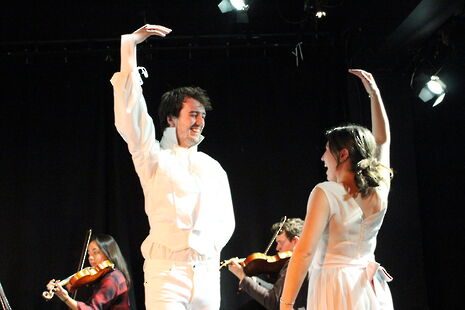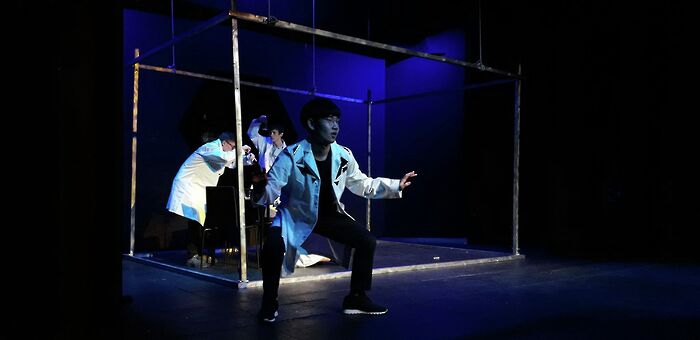Cathy: A Retelling of Wuthering Heights review
The show is well-crafted and expertly delivered; an undeniably masterful use of the Corpus Playroom

This musical adaptation of Emily Brontë’s classic novel is a stunningly innovative use of the Corpus Playroom, displaying an impressive range of vocal and compositional talent. In light of these resounding successes, more pedantic members of the audience might be inclined to forgive the liberties that are taken with the original story.
As a novel, Wuthering Heights is raw and elemental, saturated with disturbingly violent passion and, some might argue, unadaptable for any other medium. It is notoriously difficult for the story to be reworked in such a way that preserves the unique mood and power of Brontë’s text, with many adaptations - including this one - choosing to completely cut the second generation of Earnshaws, Lintons and Heathcliffs whose lives comprise half the book.
The most recent version to grace the public domain was the 2011 film directed by Andrea Arnold, which boldly elects to include absolutely no music at all. In stark contrast, Michael Bascom has translated the rich rural soundscape of the Yorkshire moors into an original score that is both admirable and enjoyable, despite occasionally detracting from the searing intensity of the words lifted from the original work.
"Maryam Dorudi’s Cathy is perfectly judged: she is magnetic, impetuous, infuriating"
Staging a musical in Corpus Playroom, however, is a theatrical feat. The production deserves the highest commendation for its delicate balancing of live music with dramatic performance in a space that has the potential to be acoustically unforgiving. There were some moments in which the dialogue was slightly obscured, but for the most part the blend was skillful. The spatial challenges of combining both band and cast onstage were also masterfully addressed, as the string players were positioned on raised platforms that lined the two walled edges of the stage. Bascom himself conducts from behind the piano that occupies the corner in a visual enactment of his role as god-like orchestrator of the overall production.
The cast are compelling and convincing, with the intensity of their interactions as a dysfunctional family unit greatly enhanced by the intimacy of the theatre. Maryam Dorudi’s Cathy is perfectly judged: she is magnetic, impetuous, infuriating. Her voice is beautiful and enviably powerful, captivating the imaginations of the audience just as she ensnares the hearts of her rival lovers. William Batty is a very impressive Heathcliff, arming Brontë’s wild man of the heath with complex emotion and a terrifying dead-eyed stare. Together, they successfully craft that sense of a love which transcends any convention or natural order: the famous deathbed scene is almost excruciating, a testament to the strength of their performance. The dressing of the characters all in white, flowy (period-appropriate) clothing is particularly effective here, giving the impression of two figures to melting into one as Heathcliff and Cathy clutch each other desperately on the floor.
The supporting characters of Edgar Linton, Nelly and Hindley are also worthy of considerable praise. Daire Toal expertly communicates Edgar’s prude, lily-livered nature with his body language before he even opens his mouth, whilst Faith Colenutt’s Nelly preserves just the right mixture of toughness and sensitivity. Will Debenham as Hindley the drunkard colours the production with humour: his almost pantomimic rendition of a song about wanting a ‘drinkety drink drink’ is truly magnificent, even if it is a slightly jarring transition from the preceding death scene.
"As an adaptation of Brontë’s novel, it leaves something to be desired: naturally, it is up to audience members to decide how much this matters to them"
As a piece of theatrical entertainment in its own right, the show is a triumph of dramatic and musical talent. As an adaptation of Brontë’s novel, it leaves something to be desired: naturally, it is up to audience members to decide how much this matters to them. In fairness, the production does openly admit to being a ‘retelling’, despite the suggested prominence of Cathy being slightly misleading. She is no more prominent in this than she is in either the first part of the original text or any other adaptation that similarly cuts out the second half. Branding a production as a ‘retelling’ suggests that something might be brought to light which was previously left untold or concealed: in this case, ‘retelling’ refers to simply reorganising the chronology of events and changing the ending, not necessarily for the better.
For me, the ending was unsatisfactory (warning: upcoming spoilers). The originality of Brontë’s love (or love-hate) story stems from Heathcliff’s stubborn survival of Cathy, his vengeful torment of all those who succeed her for many years afterwards. Somewhat blasphemously, this production has Heathcliff stab himself, after killing Edgar Linton with his bare hands, not long after Cathy’s passing. This is admittedly understandable for an hour long production - it does tie up the loose ends and I appreciate the desire for a complete story arc. But it felt too convenient, too clichéd, too reminiscent of a more basic story like Romeo and Juliet. Cathy silently crosses the stage once or twice after her death, but this doesn’t quite satisfy Heathcliff’s famously heartrending plea: ‘you said I killed you - haunt me, then! Be with me always - take any form - drive me mad!’. The resonance of her spirit and the echoes of their violent, transcendental passion die prematurely along with Heathcliff at the end of this production.
Overall, the show is well-crafted and expertly delivered; an undeniably masterful use of the Corpus Playroom. The original songs and musical score largely complement Brontë’s timeless text, with extracts from her prose lending themselves magically to melodic accompaniment for the most part. The only thing lacking is dissonance, as the more discordant elements of Cathy and Heathcliff’s story are sacrificed in favour of harmony.
 News / Right-wing billionaire Peter Thiel gives ‘antichrist’ lecture in Cambridge6 February 2026
News / Right-wing billionaire Peter Thiel gives ‘antichrist’ lecture in Cambridge6 February 2026 News / John’s duped into £10m overspend6 February 2026
News / John’s duped into £10m overspend6 February 2026 News / Epstein contacted Cambridge academics about research funding6 February 2026
News / Epstein contacted Cambridge academics about research funding6 February 2026 News / Man pleads guility to arson at Catz8 February 2026
News / Man pleads guility to arson at Catz8 February 2026 News / Corpus FemSoc no longer named after man6 February 2026
News / Corpus FemSoc no longer named after man6 February 2026









